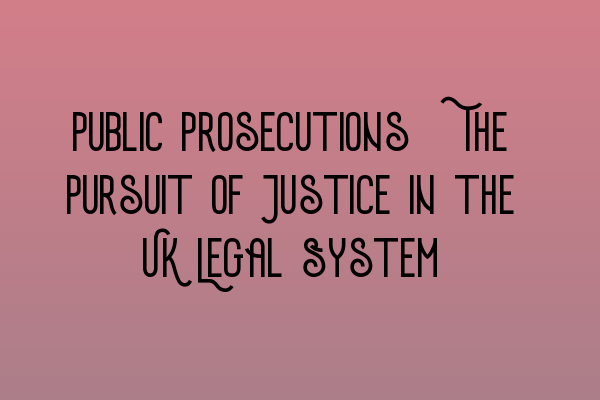Public Prosecutions: The Pursuit of Justice in the UK Legal System
Justice is the cornerstone of any functioning society, and in the United Kingdom, the pursuit of justice is carried out through the public prosecution system. The Crown Prosecution Service (CPS) plays a crucial role in ensuring that those who have committed crimes are brought to justice, while upholding the principles of fairness and impartiality. In this article, we will explore the process of public prosecutions in the UK legal system and shed light on the important work carried out by the CPS.
The Role of the Crown Prosecution Service
The CPS acts as the independent prosecuting authority in England and Wales, responsible for deciding which cases should be prosecuted and bringing them before the courts. With a team of highly skilled prosecutors, the CPS works closely with the police and other investigative agencies to build strong cases against individuals suspected of committing crimes.
One of the key aims of the CPS is to ensure that there is sufficient evidence to provide a realistic prospect of conviction. This means that the Crown Prosecution Service carefully assesses the available evidence and considers whether it is both credible and reliable. This commitment to evidential sufficiency is essential in order to maintain public confidence in the criminal justice system.
Once a case meets the evidential sufficiency threshold, the Crown Prosecution Service must also consider whether it is in the public interest to prosecute. Factors such as the seriousness of the offense, the impact on the victim, and any potential mitigation or public importance are weighed in making this decision. This ensures that resources are focused on the most significant cases and that the public’s trust in the system is upheld.
The Prosecution Process
The prosecution process begins with the gathering of evidence by the police or other investigative agencies. This evidence is then passed to the CPS, who carefully reviews it and makes a decision on whether to proceed with the case. If the decision is made to prosecute, the CPS will prepare the case for court.
During the preparation stage, the prosecution gathers further evidence, interviews witnesses, and consults with any necessary experts. The goal is to build a compelling case that presents the evidence in a clear and concise manner to the court and jury.
Once the case is prepared, it is presented in court. The prosecution presents its evidence, calls witnesses to testify, and cross-examines the defense’s witnesses. The prosecution’s role is to prove the guilt of the accused beyond a reasonable doubt, ensuring that justice is served.
The Importance of Legal Training
For individuals aspiring to become prosecutors in the UK, obtaining the necessary legal training is essential. The Solicitors Qualifying Examination (SQE) provides aspiring prosecutors with the knowledge, skills, and understanding they need to excel in their careers.
Preparation is key to success in the SQE exams, and resources such as SQE 1 Practice Exam Questions and SQE 1 Practice Mocks FLK1 FLK2 can greatly enhance one’s performance. These resources allow aspiring prosecutors to familiarize themselves with the types of questions they may encounter and develop the necessary exam techniques.
However, passing the SQE exams is just the beginning. Ongoing professional development is crucial for prosecutors to stay up-to-date with changes in legislation, procedural rules, and legal precedents. Continuing education can be attained through specialized courses such as SQE 2 Preparation Courses and SQE 1 Preparation Courses.
Conclusion
The pursuit of justice through public prosecutions is vital for maintaining law and order in society. The Crown Prosecution Service, with its commitment to evidential sufficiency and public interest considerations, plays a crucial role in ensuring that those who commit crimes are held accountable for their actions.
For individuals aspiring to become prosecutors, the Solicitors Qualifying Examination (SQE) provides the necessary training and knowledge to excel in their careers. Resources such as SRA SQE Exam Dates and specialized preparation courses can greatly enhance one’s chances of success in the SQE exams and beyond.
Ultimately, the pursuit of justice is a collaborative effort between the police, the Crown Prosecution Service, and the legal professionals involved. By working together, we can ensure that the UK legal system continues to uphold the principles of fairness, impartiality, and accountability.
